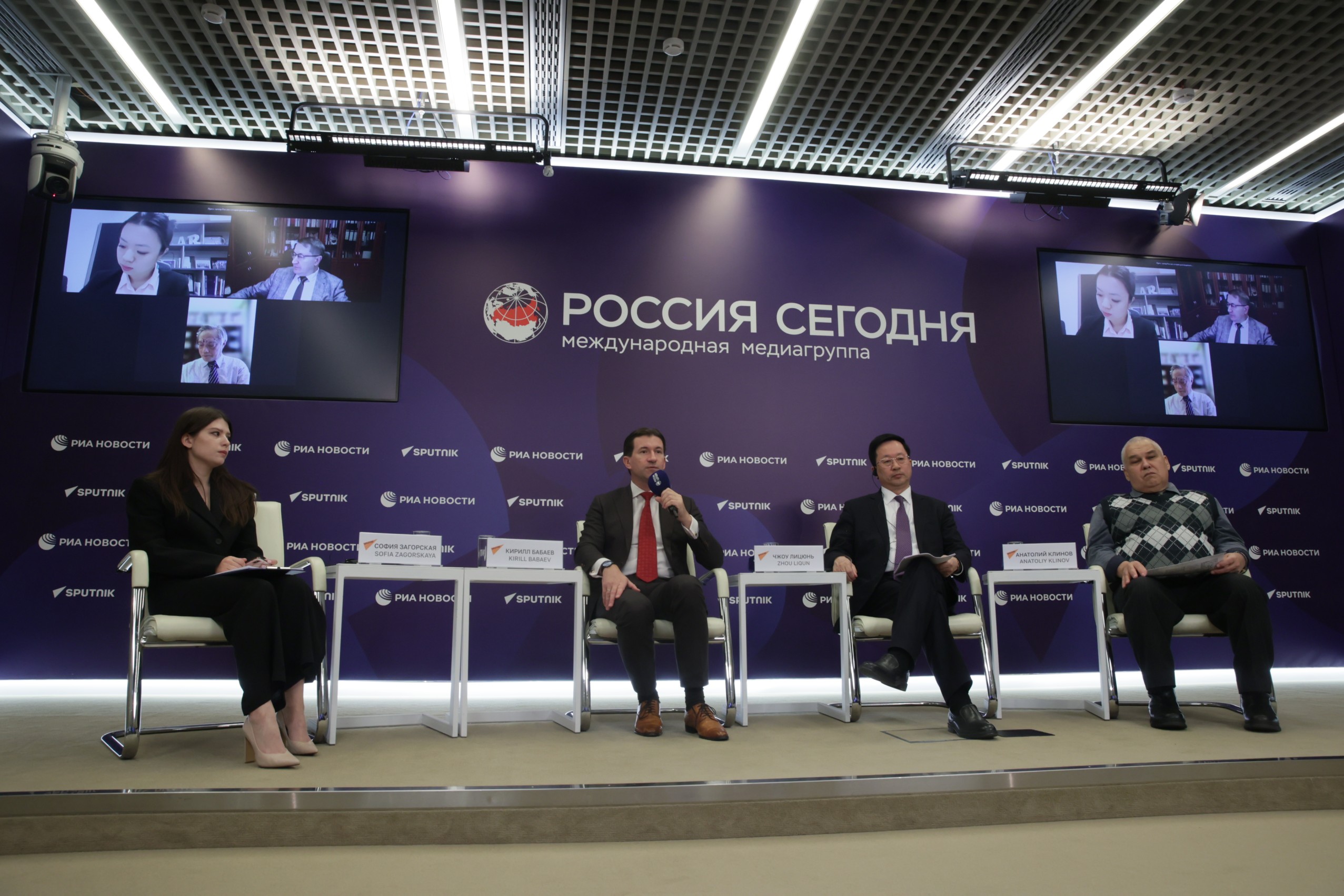Sputnik holds roundtable with leading experts from Russia and China

MOSCOW, March 20. Sputnik news agency and radio broadcaster hosted a roundtable discussion "Russia-China: Strategic Partnership and Global Challenges". The discussion continued the series of educational and expert events "New Horizons of Russia's Cooperation with the Middle East and Africa", organized in partnership with the Gorchakov Fund and the Center for Assistance to Humanitarian and Educational Programs.
Kirill Babaev, Director of the Institute of China and Modern Asia, Russian Academy of Sciences; Zhou Liqun, Chairman of the Union of Chinese Entrepreneurs in Russia; Andrey Karneev, Head of the School of Oriental Studies, Faculty of World Economy and World Politics, National Research University Higher School of Economics; Zhong Dandan, Director of International Exchange and Cooperation, Communication University of China, Feng Shaolei, Dean of the School of International and Regional Studies, Director of the Russian Studies, East China Normal University; Co-founder and President of the SCOLAR Network SCO Countries International Youth Platform and Professor of the Department of Regional and Oriental Studies Anatoly Klinov.
Kirill Babaev, Director of the Institute of China and Contemporary Asia, speaking about the main achievements of Russian-Chinese relations, emphasized their commonality of values and political views on the future of mankind: "The fact that we are united today by ideological values is extremely important for the development of our relations. Practically we share same views on how humanity should develop and how the world economy and geopolitics should be moving forward.”
Among the priority tasks for the further development of Russian-Chinese ties, Babaev named the desire for even greater cultural rapprochement between the peoples of the two countries:
"We need to know more about China, about modern China. We need to introduce into school and university education programs the courses of Chinese culture and Chinese history, cause these are subjects we still know very little about. We really need to immerse ourselves in this culture, as neither business negotiations, nor full-fledged scientific cooperation, nor simple understanding between peoples is possible without that".
Chairman of the Union of Chinese Entrepreneurs in Russia Zhou Liqun noted the positive dynamics of contacts between Russian and Chinese businesses, as well as the high level of complementarity between the economies of Russia and China, which allows the two countries to successfully increase annual trade turnover.
One of the serious obstacles to the development of trade and economic cooperation between Russia and China, Zhou Liqun considers financial restrictions and difficulties in making international payments caused by the anti-Russian sanctions of the West:
"Everyone is now discussing how to make payments between enterprises and customers. We now have to strategically solve these issues, as well as dispel the doubts and fears that Chinese business has about this. Now, in fact, 90% of all Russian-Chinese contracts are already carried out in Chinese yuan. However, we need to do our best to make the movement of financial flows more free".
Andrei Karneev, Head of the School of Oriental Studies at the National Research University Higher School of Economics, paid special attention to the fact that the world is now at a turning point in history - the period of the old international order is coming to an end, and Russia and China are at the forefront of change: "The influence of rising economies and developing countries is growing. And the balance of power is gradually shifting from the hegemony of the West to a fairer and more rational distribution of power around the world".
Russia and China, according to the expert, "strive for an international order based on peace, justice, fairness, development, freedom, democracy, international law, the right of each civilization to develop in a way that is inherent to that civilization, and not on the right of one country or group of countries to act as a global policeman."
Continuing the discussion, Feng Shaolei, director of the Russian Studies Center at East China Normal University, noted: "The development of relations between Russia and China is a historical necessity." In doing so, from his point of view, one can proceed from the traditional Chinese principle of "harmony without fusion." Following this principle, both nations can "achieve consensus and harmony by finding common ground among differences."
Anatoly Klinov, professor of the Department of Foreign Regional and Oriental Studies at Kuban State University, stated that Russia and China are "programmed to cooperate in many ways," as the historically established values, social and cultural norms of the two peoples coincide in many ways.
Zhong Dandan, Director of International Exchange and Cooperation at the China University of Communication, emphasized the importance of developing educational, informational and cultural cooperation between Russia and China as main catalysts for the development of a long-term partnership: "As we all know, this year we are celebrating the cross-cultural years of Russia and China. This initiative will also help strengthen the friendship between our countries, as it is a great way to deepen bilateral exchanges in culture and education between our countries for what is ultimately the basis of mutual understanding between peoples."





